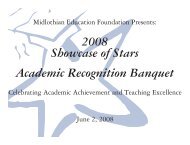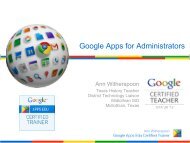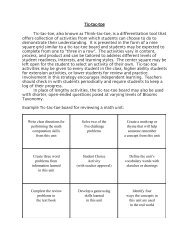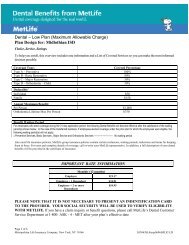District Math Coach Job Description - Midlothian ISD
District Math Coach Job Description - Midlothian ISD
District Math Coach Job Description - Midlothian ISD
Create successful ePaper yourself
Turn your PDF publications into a flip-book with our unique Google optimized e-Paper software.
<strong>District</strong> <strong>Math</strong> <strong>Coach</strong> <strong>Job</strong> <strong>Description</strong> The district math coach will assist campuses in the implementation of mathematic programs to improve student performance. The math coach will lead professional development through modeling, consulting, and training. Contract: Teacher Salary Schedule plus 20 days (207 days) Reports to: Assistant Superintendant for Learning and Campus Principals Desired Qualifications: • Texas State Provisional grades 1-‐8 • Masters degree in education, mathematics, or a related field • Three years of recent and successful experience teaching math • Successful teaching experience at more than one grade-‐level • A deep level of understanding of the Texas Essential Knowledge and Skills • Participation in some type of conceptual math training {First Steps in <strong>Math</strong>ematics, Fosnot, Glenna Tabor) • Evidence of Success in working with adult learners • Evidence of strong interpersonal skills • Evidence of strong written communication and presentation skills • Evidence of strong planning and organization skills • Evidence of successful leadership of mathematics content at a grade level, campus level, or district level • Experience in conducting mathematics staff development • Experience in mentoring/coaching teachers Responsibilities: • Assist district and campus leadership in creating a district Balanced <strong>Math</strong>ematics Framework. • Demonstrate exemplary mathematics instruction for teachers through the following: observation, coaching, model lessons, collaborative lesson design, and small/large group professional development. • Assist teachers in diagnosing student mathematics weaknesses and match these areas of need with appropriate instructional strategies and resources. • Oversee the development and implementation of common district assessments. • Make recommendations regarding instructional materials.
For the last four years, the <strong>Midlothian</strong> Department of Learning has worked to develop a Balanced <strong>Math</strong>ematics Framework that parallels our Balanced Literacy Framework. The Balanced Literacy Framework has a long and successful track record in M<strong>ISD</strong>. There is a correlation in the time, energy, and effort placed on training our teachers in the Balanced Literacy format and our State Assessment Reading scores. As reflected in our STAAR <strong>Math</strong> scores at the earliest levels, there is a need to do something more in the area of professional development. After listening to teachers and principals it is apparent that something is missing. Teachers report that they have many research based resources/materials for mathematics but they do not know when, what, and how to use to help students. They also want to see lessons modeled for them and an opportunity to ask questions and receive feedback regarding instruction. Principals have expressed a desire for the same kinds of services. They want teachers to have the ability to watch a model lesson and hear the discussion that take place. They see a need for teachers to have individual support determining what materials and strategies should be used to address student weaknesses. As a Learning Organization it is critical that we listen to the voice of the learner (in this case the teacher/principal) and provide individual/intentional support to teachers in the area of mathematics. For this reason, the Department of Learning is requesting a <strong>District</strong> <strong>Math</strong> <strong>Coach</strong> to assist in the implementation of a Balanced <strong>Math</strong>ematics Framework. The Balanced <strong>Math</strong>ematics Framework will mirror the same processes that have made the Balanced Literacy Framework successful in M<strong>ISD</strong> (modeling, observing, coaching, and training.) ________________________________________________________________ Balanced <strong>Math</strong>ematics Framework The Balanced <strong>Math</strong>ematics Framework will focus on a conceptual understanding of mathematics. The National Research Council (2001) set forth in its document Adding It Up: HelpingChildren Learn <strong>Math</strong>ematics a list of five strands, which includes conceptual understanding.The strands are intertwined and include the notions suggested by National Council of Teachers of <strong>Math</strong>ematics(NCTM) in its Learning Principle. To be mathematically proficient, a student must have:
• Conceptual understanding: comprehension of mathematical concepts, , operations, andrelations• Procedural fluency: skill in carrying out procedures flexibly, accurately,efficiently, and appropriately• Strategic competence: ability to formulate, represent, and solve mathematicalproblems• Adaptive reasoning: capacity for logical thought, reflection, explanation, andjustification• Productive disposition: habitual inclination to see mathematics as sensible,useful, and worthwhile, coupled with a belief in diligence and one's own efficacy.


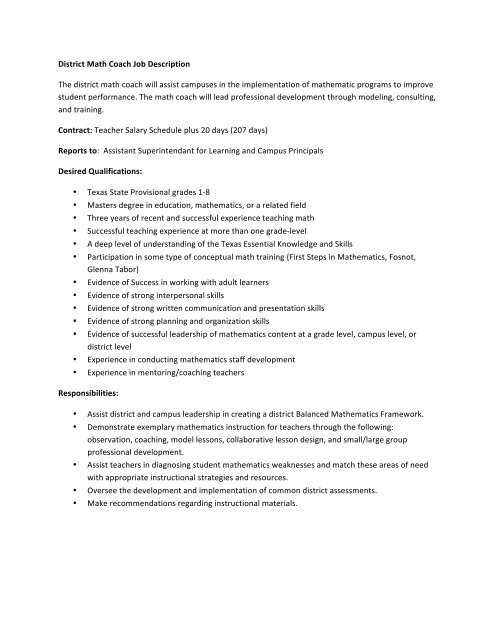
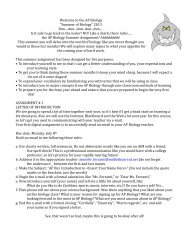

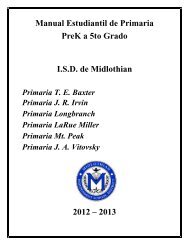


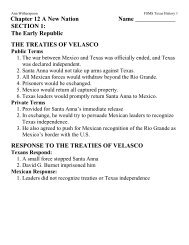
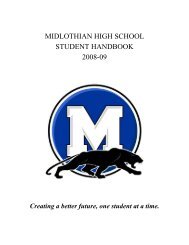

![Course Catalog [PDF] - Midlothian ISD](https://img.yumpu.com/36431290/1/190x245/course-catalog-pdf-midlothian-isd.jpg?quality=85)
